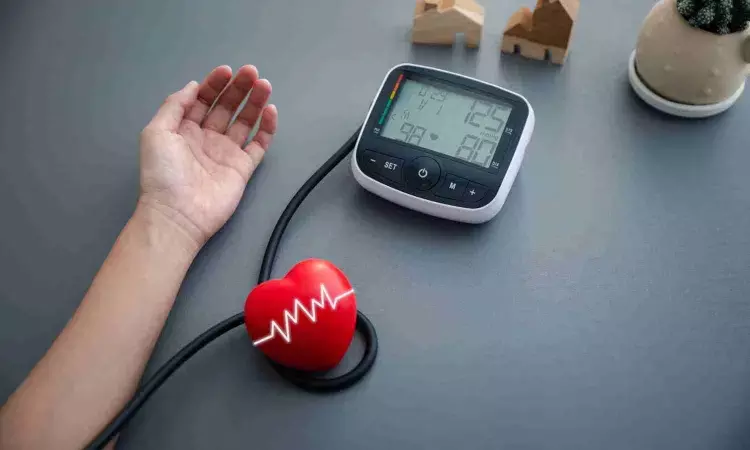- Home
- Medical news & Guidelines
- Anesthesiology
- Cardiology and CTVS
- Critical Care
- Dentistry
- Dermatology
- Diabetes and Endocrinology
- ENT
- Gastroenterology
- Medicine
- Nephrology
- Neurology
- Obstretics-Gynaecology
- Oncology
- Ophthalmology
- Orthopaedics
- Pediatrics-Neonatology
- Psychiatry
- Pulmonology
- Radiology
- Surgery
- Urology
- Laboratory Medicine
- Diet
- Nursing
- Paramedical
- Physiotherapy
- Health news
- Fact Check
- Bone Health Fact Check
- Brain Health Fact Check
- Cancer Related Fact Check
- Child Care Fact Check
- Dental and oral health fact check
- Diabetes and metabolic health fact check
- Diet and Nutrition Fact Check
- Eye and ENT Care Fact Check
- Fitness fact check
- Gut health fact check
- Heart health fact check
- Kidney health fact check
- Medical education fact check
- Men's health fact check
- Respiratory fact check
- Skin and hair care fact check
- Vaccine and Immunization fact check
- Women's health fact check
- AYUSH
- State News
- Andaman and Nicobar Islands
- Andhra Pradesh
- Arunachal Pradesh
- Assam
- Bihar
- Chandigarh
- Chattisgarh
- Dadra and Nagar Haveli
- Daman and Diu
- Delhi
- Goa
- Gujarat
- Haryana
- Himachal Pradesh
- Jammu & Kashmir
- Jharkhand
- Karnataka
- Kerala
- Ladakh
- Lakshadweep
- Madhya Pradesh
- Maharashtra
- Manipur
- Meghalaya
- Mizoram
- Nagaland
- Odisha
- Puducherry
- Punjab
- Rajasthan
- Sikkim
- Tamil Nadu
- Telangana
- Tripura
- Uttar Pradesh
- Uttrakhand
- West Bengal
- Medical Education
- Industry
Fluctuating blood pressure tied to problems with thinking skills, unravels study

Older adults whose blood pressure fluctuates over time may be more likely to have problems with thinking and memory skills, according to a study published in the December 11, 2024, online issue of Neurology®, the medical journal of the American Academy of Neurology. The association was found in Black participants but not in white participants in the study.
The study does not prove that fluctuations in blood pressure cause problems with thinking skills; it only shows an association.
“These results suggest that fluctuation in blood pressure is a risk factor for cognitive problems beyond the negative effects of high blood pressure itself,” said study author Anisa Dhana, MD, MSc, of Rush University in Chicago. “Older adults should be routinely monitored for their blood pressure and any changes over time so we can identify people who may have this issue and work to alleviate it, which could potentially help to prevent or delay cognitive problems.”
The study involved 4,770 people with an average age of 71; 66% were Black participants, and the remaining were white participants.
Participants had blood pressure tests at the beginning of the study and then every three years for an average of 10 years. They also completed thinking and memory skills tests at the beginning and at their last visit.
Overall, the participants had an average blood pressure of 138/78 mmHg. High blood pressure is defined as 130/80 mmHg and higher.
Black participants in the study had an average variation over time in their systolic blood pressure, which is the top number, of 18 mmHg, compared to 16 mmHg for white participants.
The participants were divided into three groups based on how much their blood pressure varied over time. For Black participants, those with the most variability in their blood pressure had lower scores on the cognitive tests than those with the least variability. The difference in scores was the equivalent of 2.8 years of cognitive aging.
For people taking blood pressure medications at the start of the study, there was no difference in scores on thinking tests at the end of the study among the groups with high and low blood pressure variation.
“With our aging society and the prevalence of Alzheimer’s disease, identifying prevention strategies to slow the decline of cognitive skills in older adults has become a public health priority,” Dhana said. “Managing blood pressure and its fluctuations is emerging as an essential risk factor that can be modified.”
A limitation of the study is that participants were Black and white people, so the results may not apply to people of other races.
Reference:
Dhana, A., et al. (2024) Blood Pressure Variability and Cognition in Black and White Older Adults Over 18 Years of Follow-up. A Population-Based Cohort Study. Neurology. doi.org/10.1212/WNL.0000000000210151.
Dr Kamal Kant Kohli-MBBS, DTCD- a chest specialist with more than 30 years of practice and a flair for writing clinical articles, Dr Kamal Kant Kohli joined Medical Dialogues as a Chief Editor of Medical News. Besides writing articles, as an editor, he proofreads and verifies all the medical content published on Medical Dialogues including those coming from journals, studies,medical conferences,guidelines etc. Email: drkohli@medicaldialogues.in. Contact no. 011-43720751


